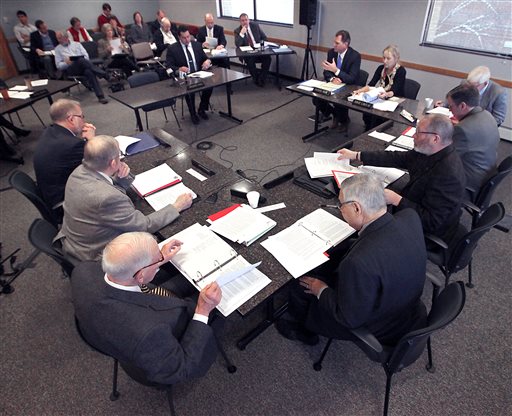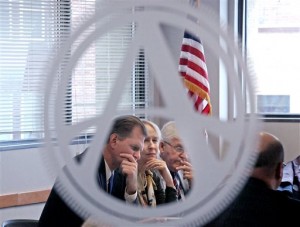Nonpartisan elections board targeted for overhaul
By: Associated Press//July 27, 2015//

By SCOTT BAUER
Associated Press
MADISON, Wis. (AP) — Stung by a corruption scandal that led to the convictions of five lawmakers, a longtime Republican state senator met with the head of a government watchdog agency at a bar down the street from the Capitol to talk about how to improve ethics oversight.
“I literally wrote on a napkin, ‘Government Accountability Board,'” former Sen. Mike Ellis said, recalling that 2005 meeting with Common Cause in Wisconsin director Jay Heck. “It started on a napkin.”
Now the nonpartisan elections and ethics oversight board Ellis helped create under a broad bipartisan deal, unique in its structure nationwide, faces elimination. It’s being targeted by Gov. Scott Walker and Republican lawmakers after questions over the board’s involvement in a secret investigation into Walker and other conservative groups that the Wisconsin Supreme Court earlier this month declared unconstitutional.
That followed years of mounting concerns over issues both big and small, including how it handled 2011 and 2012 recall elections sparked by the fight over collective bargaining for public unions; designs of ballots in the 2014 election; its interpretation of state law governing issue advocacy; and hiring decisions.
Walker, soon after launching his campaign for president, last week called on the board to be eliminated. Republican legislative leaders have been talking for months about making changes and are expected to come forward with a proposal in the fall.
Even Ellis, a champion of the GAB when it began in 2008, doesn’t think it can continue unchanged.
“Early on I think it was a success,” said Ellis, who retired from the Senate last year. “When the political climate began to change, some of their decisions were a little bit off center.”
Heck worked closely with Ellis and both parties on the compromise that led to the creation of the board. He said the concerns being aired by its critics now are an attempt by partisan lawmakers to regain control over an independent agency that’s held up as a model nationwide.
“The criticism is hyped up,” Heck said. “I’m not convinced they’ve done anything that’s favored one side or the other.”
Trying to keep the board nonpartisan is “a fool’s game,” said conservative attorney Rick Esenberg, a frequent critic of the GAB. He favors hiring partisan attorneys to advise the judges on the board. Some lawmakers have discussed returning to a partisan board, an idea that Walker has not rejected.
The board’s critics commonly complain that the GAB routinely goes beyond its authority in enforcing the law, acting as an advocate rather than a regulator.
“They have to remember they are regulators, not policy makers,” said campaign finance attorney Mike Wittenwyler, who sued the board over rules it adopted in 2010 requiring more disclosure and regulation of groups that ran issue ads. The GAB backed off in order to settle the lawsuit.
A federal appeals court ruling in 2014 went even further in declaring unconstitutional major portions of Wisconsin’s campaign finance law, as well as rules the GAB wrote trying to regulate spending by outside groups.

Republican concerns reached a new level in the wake of the investigation into Walker and conservative groups that the GAB voted to approve.
One of the targets of that investigation, the Wisconsin Club for Growth, has a lawsuit against GAB pending in Waukesha County, arguing the board “exceeded its statutory authority and evaded its statutory obligations” by pursuing the secretive investigation. The Wisconsin Supreme Court earlier this month ordered an end to the investigation, saying there was nothing illegal about any of the campaign activity.
The current claims of partisanship by the board come after a rare example of bipartisanship that led to its creation.
The previously separate Ethics and Elections boards were widely derided as weak and ineffective largely due to their partisan makeup. With five former lawmakers convicted in a two-year span after an investigation into illegal campaigning, together with polls showing the public losing faith in their honesty, the Legislature came together in 2007 to create the GAB.
No Republicans voted against the deal, and only two Democrats in the Assembly voted against it. Gov. Jim Doyle, a Democrat, signed the bill following a special session to create the GAB starting in 2008.
Republicans and Democrats heralded it at the time, with legislative leaders issuing a joint statement promising it would “restore the public’s faith in their government.”
But that bipartisan spirit didn’t last long.
The initial decision to hire Kevin Kennedy, who had been the head of the Elections Board since 1983 after working there since 1979, elicited concerns about whether the GAB was truly charting a new path. The board’s re-approval of the majority of previous policies and decisions of the Elections Board only furthered those concerns.
More complaints came during the 2011 and 2012 recalls.
There were concerns over how the elections were scheduled and the decision by GAB not to independently verify every signature on petitions submitted to force the elections.
Kennedy, in a statement reacting to Walker’s comments calling for a new approach, defended the board as being “professional, unbiased, and nonpartisan.”
“We have been accountable not to any single individual or political party, but to the will of the people of Wisconsin as expressed in its laws,” Kennedy said. “The Legislature and Governor are free to change those laws of course, but I am proud of what the agency has achieved since its inception. It would be shortsighted to simply disregard that success.” Follow @sbauerAP
Legal News
- Former law enforcement praise state’s response brief in Steven Avery case
- Eric Toney announces re-election bid for Fond du Lac County District Attorney
- Former Wisconsin Democratic Rep. Peter Barca announces new bid for Congress
- Republicans file lawsuit challenging Evers’s partial vetoes to literacy bill
- More human remains believed those of missing woman wash up on Milwaukee Co. beach
- Vice President Harris returning to Wisconsin for third visit this year
- Wisconsin joins Feds, dozens of states to hold airlines accountable for bad behavior
- Trump ahead of Biden in new Marquette poll
- Bankruptcy court approves Milwaukee Marriott Downtown ‘business as usual’ motion
- New Crime Gun Intelligence Center to launch in Chicago
- Arrest warrant proposed for Minocqua Brewing owner who filed Lawsuit against Town of Minocqua
- Wisconsin Supreme Court justices question how much power Legislature should have
WLJ People
- Power 30 Personal Injury Attorneys – Russell Nicolet
- Power 30 Personal Injury Attorneys – Benjamin Nicolet
- Power 30 Personal Injury Attorneys – Dustin T. Woehl
- Power 30 Personal Injury Attorneys – Katherine Metzger
- Power 30 Personal Injury Attorneys – Joseph Ryan
- Power 30 Personal Injury Attorneys – James M. Ryan
- Power 30 Personal Injury Attorneys – Dana Wachs
- Power 30 Personal Injury Attorneys – Mark L. Thomsen
- Power 30 Personal Injury Attorneys – Matthew Lein
- Power 30 Personal Injury Attorneys – Jeffrey A. Pitman
- Power 30 Personal Injury Attorneys – William Pemberton
- Power 30 Personal Injury Attorneys – Howard S. Sicula











